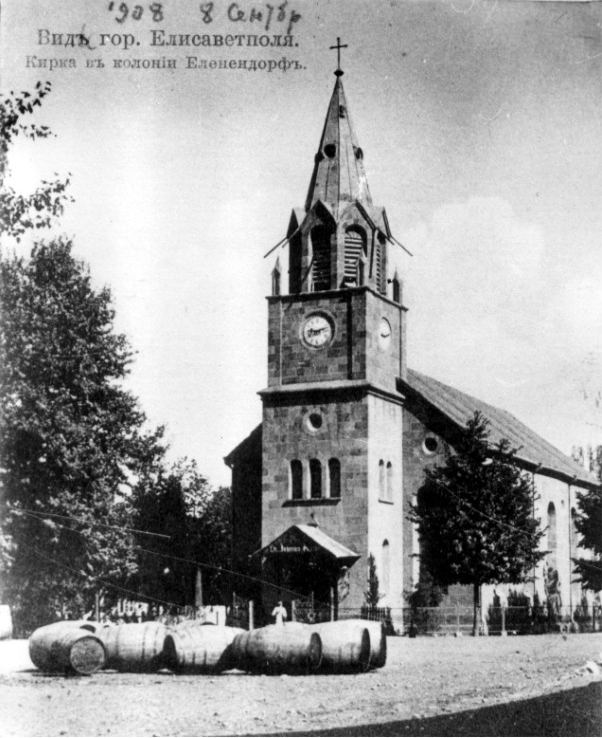Elenendorf (German: Helenendorf) was founded by German colonists from Swabia in the spring of 1819. It was located in Transcaucasia (now Azerbaijan). The colony was named in honor of the Grand Duchess Elena Pavlovna, the daughter of the Tsar Paul I.
On 10 May 1817, Tsar Alexander I signed a petition granting permission for 700 Swabian families from Württemberg to resettle in Transcaucasia (today Azerbaijan). The German city of Ulm was appointed the assembly point, from where the settlers were sent on ships down the Danube to Izmail. They spent the first winter in the Black Sea German colonies of Peterstal, Josefstal, Karlstal, and other Swabian villages. Under the leadership of Gottlieb Koch, Duke Shiman, Jakov Krause, and Johannes Wuhrer, the settlers traveled to the Transcaucasia region arriving in the winter of 1818 and stayed in the town of Elisabethpol. In August 1819, they finally reached in the settlement area. Six settlements were founded in what today is the country of Georgia and two (Annenfeld and Helenendorf) in what today is the country of Azerbaijan. Helenendorf was founded on 22 August 1819.
In total, of the seven hundred families that left Ulm, only about four hundred reached the new settlement area in the Transcaucasia. Many settlers died in route. Some stayed in the Black Sea region. The original group was joined by about 100 families that had settled earlier in the Black Sea colonies.
There were 127 Swabian families (approximately 600 people) who were the founders of the Helenendorf. They came primarily from Reutlingen. Life was very difficult for the original settlers. Initially, the colonists lived in dugouts.
Soviet collectivization began in the village in 1926. The wealthy German farmers were convicted of a variety of anti-Soviet crimes. Their property was confiscated, and they and their families were sent to labor camps in Kazakhstan. By 1935, over 600 German families were sent to labor camps.
The 28 August 1941 Deporation Decree was carried out in Helenendorf in October 1941 and resulted in the eviction of the remaining 2,675 Germans living there.
From 1931-1938, the town was called Yelenino and from 1938–2008 it was known as Khanlar. Today, Helenendorf is known as Goygol.
A Lutheran Parish was founded in Helenendorf in 1854. It was served by the following pastors:
Woldemar Engelhardt (1910-1926)
The following Volga German families settled in and around Helenendorf:
Heil from Lauwe
Gleim from Lauwe
- Goygol (city) (Wikipedia)

German Lutheran Church in Helenendorf (1908).
Source: Wikipedia Commons.